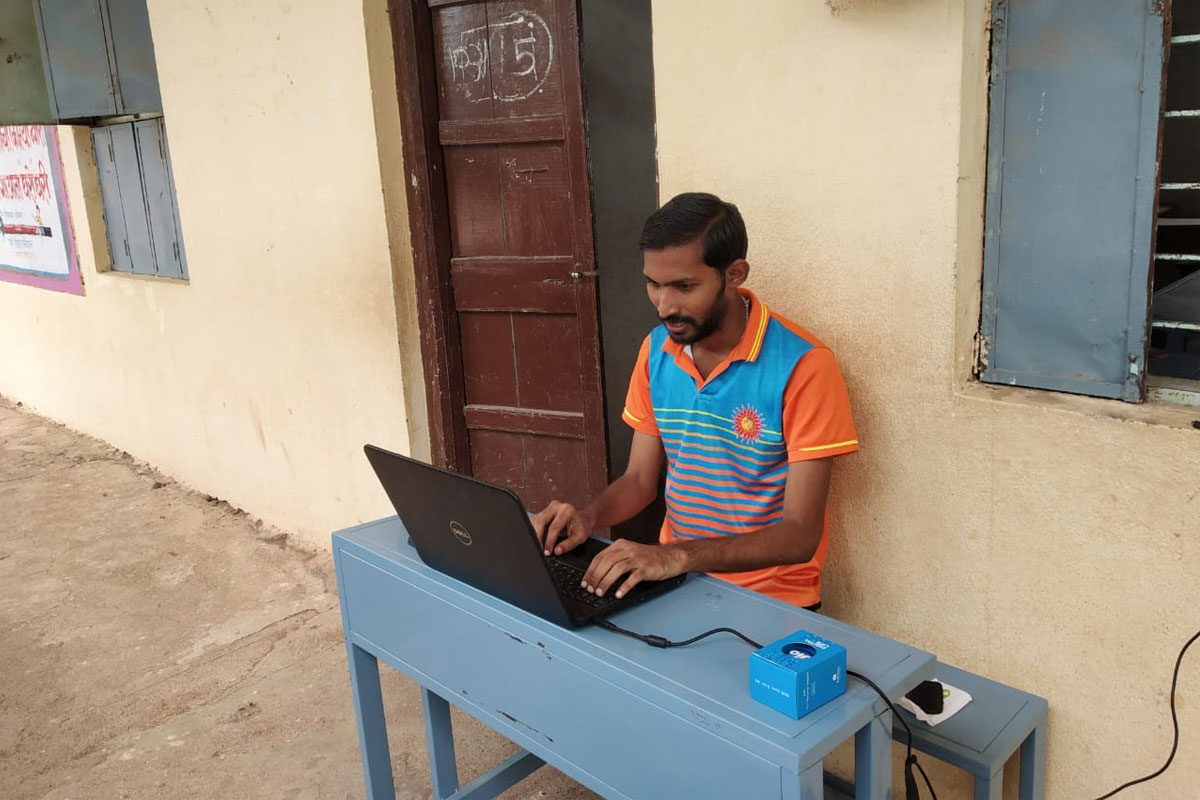Ankush Kolekar coding while quarantined at his village school
Video calls while working from home go smoothly for Ankush Kolekar on his fast 10mbps connection except when an argument erupts outside his neighbour’s front door, just 3 feet from his own. Or when the electrical hub in his Mumbai slum blows a fuse or catches fire, unable to cope with excess demand. His internet connection is ordinarily reliable, but is vulnerable to a repairman’s errant snip – not an infrequent mistake when navigating a tangled snarl of electrical, cable and internet wiring that runs through the slum.
Last month, I wrote an enthusiastic article on the benefits of working from home. While I acknowledged that WFH is not for everyone, the article did take a narrow and somewhat privileged view. Today, while still staying within the realm of white collar professionals (blue collar jobs are largely not suited to WFH), I broaden the conversation to include those whose homes are not the sanctuary that many of us are fortunate to have.
Working from a Slum
Ankush, a software engineer at a small product development company in Mumbai, has trouble concentrating while working from the only home he has ever known. He was brought up in the Tembipada slum in the outskirts of Mumbai, where he has lived for 26 of his 27 years. His father, now retired to their ancestral village, worked as a labourer moving rice and wheat at a Mumbai wholesale market, while putting his two sons through college.
Ankush shares a 2 room – not 2 bedroom – home with his brother and his brother’s wife. He sleeps and works on the ground floor, which also doubles as the family/TV room and kitchen, while his brother and sister-in-law occupy the floor above. The infamous May heat and humidity of Mumbai are oppressive and a far cry from the air conditioned work environment he is used to. But that is not his greatest worry.
Something as routine as a toilet break is a source of anxiety. The public toilet is shared by 40 or 50 homes, defeating the social distancing that the government envisioned with the lockdown. Ankush worries about the possibility of infection as he waits in line, or enters the toilet. Covid19 cases have been on the rise in the slum.
Ankush’s slum strains from the burden of a higher than usual daytime population. While electricity and the internet, despite occasional cuts, are reliable at most times, water flows from a shared water connection for only 2 hours every 5 days – a total of 12 hours in a month. Each connection is shared by 3 homes, leaving 40 minutes for each home to store water for their needs. The supply has remained consistently low – lockdown or not – but with higher daytime demand, scarcity breeds tensions, and tensions spill over into loud altercations, interrupting Ankush’s work.
Ten days ago, Ankush and his brother and sister-in-law moved to their village. A neighbour two doors away was suspected of Covid, and Ankush and family feared they were candidates for the quarantine stamp of indelible ink on the back of their hands, which would have severely restricted their movements. They are now quarantined for a 14 day period at the village school, where Ankush continues to work from ‘home’.
Office Dreams…
When going through on-campus recruitment in his final year of college, like many engineering graduates, Ankush had imagined working in a shiny glass building for a large IT company. His current employer is smaller and has a humbler office – one that I have visited – in a warehouse district in Wadala, Mumbai. These are not warehouses in the mould of the trendy spaces in areas such as South of Market in San Francisco. They are, quite literally, unglamorous storage spaces, interspersed with unassuming offices.
Pre-lockdown, Ankush commuted an hour and twenty minutes in each direction, by way of motorcycle, train and a shared taxi. But the commute did not overly bother him, as his college commute, at two hours, had been even longer. Nor did he find time at the office to be overly constraining, as his company is flexible with time off to attend to personal errands. He misses the discussions and learning that the workplace enables, and cannot wait to return to the office.
When asked about the current hype surrounding working from home, he responds that it appeals to those who have more space and facilities at home, without the distractions and inconveniences that he needs to contend with daily.
…Shared by Many
Ankush is not alone, of course, in his desire to be at the office, particularly in a country like India. His co-worker Dinesh Kandu lives in a joint family and his home, while simple, is larger and better equipped than Ankush’s. Yet, he battles with electrical outages frequently, sometimes in long stretches of 4 hours. The electrical inverter installed at home stores limited power for use during outages, but to use it his laptop must compete with the family TV.
Dinesh doesn’t mind commuting either. The majority of his two and a half hour commute is by train, which gives him the opportunity to pull up a software tutorial on his mobile device and shut the world out. He too misses the office for the opportunity to learn and grow with colleagues.
I sought out Akshay Kapoor, a young architect running his own firm in Delhi, who was born in small town Bhagalpur, Bihar, in Northern India for his opinion. He observed that everyone from a small town dreams of working in a big and modern office. He has moved onto liking smaller and more intimate spaces, but still prefers the office to home, as he misses the buzz and energy of in-person brainstorming in a creative profession.
Lingering at the Office
I remember a fresh-out-of-college eager-beaver at my former employer Myntra – India’s largest fashion e-tailer owned by Flipkart and now, Walmart. Breathless with excitement at Myntra’s fashionable offices, free food and recreational activities, he would stay at the office till late playing badminton or chatting with co-workers.
“I LOVE it here!”, he once declared. I did not give much thought at the time to how Myntra’s well equipped office might compare to his home.
But now, I think back to young colleagues in India who seem to stay at the office longer than they really need to. Many are devoted to their work. Some linger to find companionship and love. Others, perhaps, are simply not ready to go home.
——-
Liked this article? Subscribe to the Indiginus monthly newsletter to receive future ones in your inbox.
At Indiginus, we are actively working on projects with clients who are preparing for a different future than they envisioned just a couple of months ago.
Join the change! Contact us to begin the journey.




